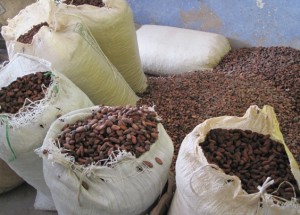Seeing Fair Trade in Action at a Colombian Chocolate Factory

Campo Anibal and I shared some laughs as he showed me around his Fair Trade Certified farm in the heat.
Last fall I had the pleasure of traveling to beautiful Colombia to visit the birthplace of the delicious Fair Trade Certified™ Cordillera chocolate with which Bon Appétit Management Company chefs bake. Now that I’ve gone over the basics in my first post and told you all about farming cacao in my second, I can now talk about the social responsibility aspect of the business.
The Compañía Nacional de Chocolates (CNC) is one of the largest companies in Colombia, and its labels state its commitment to farmers. My experience, though limited, did seem to confirm that it wasn’t just boasting. Since the inception of the Cacao Promotion Division in 1958, the company has been working directly with farmers like Campo Anibal to conduct research, educate farmers on best practices, and improve their yield in an environmentally conscious way.
The CNC works to empower the more than 45,000 cacao families they work with, offering programs to help them buy farmland and encouraging them to expand their business and start co-ops at which all the farmers in the region will drop off their fermented and dried cacao beans. The next step is to transport them to the factory, where they’ll be tasted, classified, and cleaned before the real fun begins.
I could smell the factory before I could see it. We descended the mountain from the airport to the CNC’s biggest factory in Rionegra, Colombia, eventually getting below the clouds so that I could see the cities in the valley below. Between the incredible views and the constant smell of chocolate, I don’t know how anyone ever gets any work done in this beautiful country.
The CNC’s logo/motto is “committed to farmers,” but they also seem to care about all of their employees, as was evident throughout the factory.
In Colombia, a country known for its human rights and labor abuses, a huge problem is companies hiring temporary workers, who have few rights and can be fired at will. Some companies have as much as 90% or more of their workers as uncontracted labor. At the CNC factories, only about 10% to 12% of their workers are temporary, depending on the time of year: some short-term workers are hired to handle the fluctuation of supply and demand, as well as to work on special projects.
The CNC’s 1,150 contracted workers at the factory I visited enjoy many perks and benefits. In addition to being paid twice the minimum wage for a job that would usually earn them the minimum (if that), workers get paid time off, and two paid breaks during the day where the company pays for their meal. They get bonuses throughout the year, have project teams they vote on to research energy usage and possible improvements in their area, and the company pays for their health care in full. There are even scholarship programs for their kids.
CNC also employs, in the Bon Bon section’s seasonal, lower-risk jobs, people with mental or physical disabilities, thus incorporating a population into the workforce that usually must depend on government subsidies to get by. It seemed everywhere we turned in the factory, my tour guide Santiago had some story to share about how the company went above and beyond to help one of their employees, like giving one man’s parents’ jobs when they fell on hard times, paying for funerals and memorial services, giving paid time off, etc.
It wasn’t just Santiago. Everyone I talked to in Colombia knew and revered the CNC for the way it takes care of its employees as well as the community. Bon Appétit Management Company, which is leading the fight for farmworkers’ rights in the U.S., is proud to serve the CNC’s Cordillera chocolate in our cafés.
